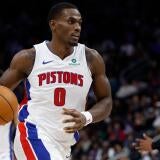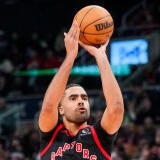NBA storylines you've likely forgotten since the season shut down in March
In case you need a refresher on what was happening in the NBA before the season ground to a halt...
Here's a fun fact: the portion of the NBA season that we saw, from Oct. 22 through March 11, lasted a total of 141 days. If the NBA does indeed return on July 31, we will have had a grand total of 141 days without a professional basketball game. The hiatus, as currently planned, will be just as long as the season was.
With that in mind, you could be forgiven for forgetting what exactly was going on in the NBA before the season stopped. So with the playoffs looming, let's take a quick look back at what was happening in the league right around the suspension of the season, and how those storylines will impact the coming postseason.
Milton mania
For his career, Shaquille O'Neal shot 58.3 percent on 2-point attempts. That's an impressive number. It just happens to look a bit small compared to this one: over his past nine games, Philadelphia 76ers guard Shake Milton is shooting 60.4 percent... on 3-pointers. That's right, when the NBA shut down, Shake Milton was a safer bet from behind the arc than Shaq was within it.
Now, was that sustainable? Absolutely not. But it's not like Milton was a one-trick pony. Across that nine-game stretch, he averaged 17.8 points per game on 57.4 percent from the field as Philadelphia's starting point guard. Not many specialists can do this:
Shake Milton with the left-hand hammer 🔨 pic.twitter.com/zuZoWLm4jh
— ESPN (@espn) March 1, 2020
The elephant in the room here is that other 76ers point guard. Ben Simmons played a grand total of four minutes and 44 seconds during Milton mania. Had the season continued unabated, we would have gotten a far greater sample of Milton on his own, but when the season picks up at Disney, Simmons is going to be healthy enough to play.
That poses a problem, because, in the admittedly limited 476-possession sample available, the 76ers were terrible offensively with Simmons and Milton on the floor together. They scored a paltry 104.2 points per 100 possessions, per Cleaning the Glass, and the most used five-man lineup that the two of them shared was limited to only 86.8. Again, we're dealing with very little data here, and if Milton can shoot anywhere near as well with Simmons as he did without him, the two are going to fit together beautifully.
But Simmons' absence created a star. Philadelphia's offense functioned far more cleanly with that star than it ever did with Simmons, as the 76ers scored an absolutely staggering 121.9 points per 100 possessions when Milton played without his more famous teammate. Simmons' playoff issues are well-known. The 76ers are not going to win a championship with him planted in the dunker's spot. How long a leash will Brett Brown give Simmons before turning the offense back over to Milton? Can the two find any sort of chemistry together? The Milton-Simmons debate that didn't exist until nine games ago is going to define Philly's postseason, and if Milton plays well enough, potentially its entire future.
The Los Angeles arms race
When the Lakers and Clippers went to war for Kawhi Leonard, one could have assumed that it was over when the reigning Finals MVP chose the Clippers. Nope. The two Western Conference favorites turned out to have astonishingly similar tastes in players. First, former Clippers Avery Bradley and Jared Dudley signed with the Lakers. The Clippers had already relieved the Lakers of young center Ivica Zubac. When the trade deadline came, both pursued New York Knicks forward Marcus Morris. The Clippers won, but the Lakers landed his twin brother Markieff in the buyout market, a signing they made only after losing out on Reggie Jackson to the Clippers.
The arms race continued to escalate right up to the final days of the original NBA season. Only five days before the shutdown, the Lakers brought in former lottery pick Dion Waiters. Not to be outdone, the Clippers signed former All-Star center Joakim Noah only three days later, a player that the Lakers worked out over the summer before signing Dwight Howard.
Neither team is expected to make a major addition during the NBA's upcoming transaction window. The Lakers don't have any empty roster spots. The Clippers do, but will likely use it to retain Noah. But given their mutual obsession, nothing should be ruled out. There's still time for one last off-court fracas before the inevitable Western Conference finals showdown.
Dominant lineups on bubble teams
Only three five-man lineups in all of basketball have outscored opponents by more than 20 points per 100 possessions while also playing at least 100 total minutes. The first should surprise nobody: Oklahoma City's dominant three-point guard alignment has decimated opponents to the tune of 29.9 points per 100. The other two belong to sub-.500 teams.
Since Zion Williamson returned, the New Orleans Pelicans have had the NBA's best starting lineup. The group of Williamson, Brandon Ingram, Jrue Holiday, Lonzo Ball and Derrick Favors has blitzed opponents by 26.3 points per 100 possessions. But Williamson wasn't the only recent No. 1 overall pick to rejoin his team around New Years'. On Dec. 30, DeAndre Ayton returned to the Phoenix Suns in earnest, and ever since then, the starting group of him, Devin Booker, Ricky Rubio, Mikal Bridges and Kelly Oubre are beating opponents by 20.2 points per 100 possessions.
In a sense, what has happened in New Orleans was somewhat predictable. Williamson is an utterly unique physical specimen that has exceeded our wildest expectations for his rookie season. There is no set formula for defending him yet because there simply isn't enough tape on him to build one. Teams were always going to struggle with his raw physicality at first. What was happening in Phoenix, though, defied all logic.
Oubre, a career 32.9 percent 3-point shooter, vaulted up to 38.6 percent after Ayton's return on 6.4 attempts per game before tearing his meniscus. Bridges experienced a similar jump, from 31.5 percent this season before Ayton's comeback to 37.1 percent afterward. Ayton obviously creates space, but no center has such a dramatic effect on their teammates shooting. Those numbers are going to regress, but when even a famous non-shooter like Ricky Rubio jumps from 31.6 percent prior to Ayton's return to 38.9 percent afterward, something meaningful has to be going on.
New Orleans is tied for pole position at No. 9 in the Western Conference. Phoenix needs to make up 2.5 games just to tie the clump currently stuck at No. 9. There is no guarantee either even reaches the play-in, much less the playoffs. But both carry enormous upset potential if they manage to earn a ticket to the dance. Rotations shorten in the postseason. Those excellent starting fives, assuming Oubre is healthy enough to play at Disney, would pose serious problems playing extra minutes in the playoffs.
The $94 million reserve
Buddy Hield's contract negotiations with the Kings last offseason were public and contentious. Eventually, the two sides settled on a $94 million extension, but you wouldn't know it based on their attitude during the season. Hield has publicly claimed that the Kings have trust issues while also criticizing Luke Walton's slower playing style. The Kings, in turn, benched Hield in mid-January. That move wound up saving Sacramento's season.
The Kings were 15 and 29 when they took Hield out of the starting lineup. They are 13-7 since. The move hasn't come at Hield's expense either. His raw scoring remains stable, but he has earned his points far more efficiently. After shooting 36 percent from behind the arc as a starter, he is up to nearly 48 percent off of the bench. While Hield is more than capable of playing fast, the Kings finally started running only after he was removed from the starting five. The Kings were 27th in pace with Hield as a starter, but are 15th since benching him.
The Hield move didn't magically fix all of Sacramento's problems. DeAaron Fox's health and month-by-month defensive improvement have been critical as well. But having Bogdan Bogdanovic on the floor as an extra ball-handler with the starters has unlocked quite a bit offensively, while weaker defensive bench units have been unable to successfully track Hield through screens. The Pelicans have the highest upside of any of the Western Conference bubble teams, but Sacramento was coming on strong before the season stopped and should be heard from in the race for No. 9.
Russell Westbrook is... efficient now?
Clint Capela played his last game as a Rocket on Jan. 29. Since then, Russell Westbrook is not only averaging 31 points per game but is doing so on 52.5 percent shooting from the field and 35.5 percent from behind the arc. Only a year ago, Westbrook had one of the most inefficient shooting seasons in NBA history. But once the Rockets downsized? He's been downright unstoppable.
In fact, it would not be a stretch to say Westbrook has been better than James Harden since the Rockets ditched the center position. In that same span, he is averaging an identical 31 points per game, but on only 43.3 percent from the field and 34.5 percent on 3-pointers. The shift is ironic given how heavily Westbrook relied on Harden earlier in the season. He didn't truly get going until teams started doubling Harden upon crossing half-court. Now Westbrook is picking up the slack as Harden struggles.
Westbrook is probably going to get worse and Harden is probably going to get better, but the space that small ball has granted Westbrook as a driver isn't going away. Surrounding him with four shooters not only unleashes him but makes it impossible for defenses to commit the sort of resources they typically would to Harden. Houston is still subject to the whims of the shooting gods. A few bad nights could knock them out of the playoffs. But they've landed on an identity that enhances their superstars now. That won't guarantee a championship, but self-awareness has at least maximized their odds.


















